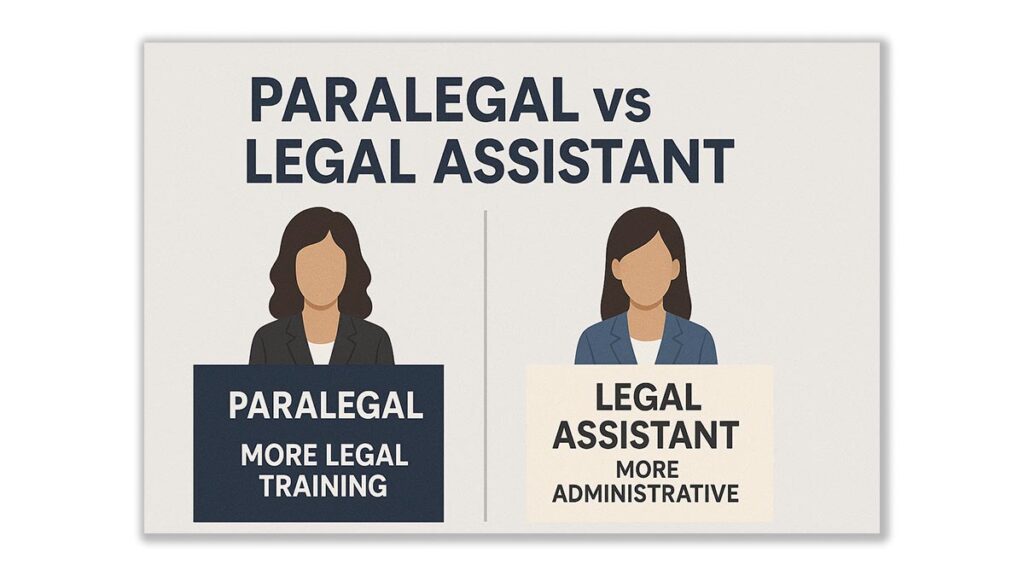The comparison between legal assistant versus paralegal is essential for understanding the distinct roles these professionals play within a law firm. While both provide critical support to attorneys, their responsibilities, qualifications, and areas of focus differ significantly. This article explores the key differences, helping law firms and clients make informed decisions.
Legal Assistant Versus Paralegal: Defining the Roles
Definition of Legal Assistant: A legal assistant primarily focuses on administrative tasks to ensure the efficient operation of a law office. Their responsibilities include:
- Scheduling meetings and court dates.
- Managing client communication.
- Organizing and maintaining case files.
- Preparing routine correspondence.
Definition of Paralegal: Paralegals handle more substantive legal tasks that require specialized knowledge of legal processes. Their duties typically include:
- Conducting legal research.
- Drafting pleadings, contracts, and other legal documents.
- Assisting attorneys with trial preparation.
- Managing discovery processes.
While there is some overlap, the distinction between legal assistant versus paralegal lies in the scope of their responsibilities and the level of expertise required.

Educational and Certification Requirements: Legal Assistant Versus Paralegal
Legal Assistant: Legal assistants generally do not require formal legal education. A high school diploma or associate degree, coupled with strong organizational and communication skills, is often sufficient. Some legal assistants pursue certifications to enhance their qualifications.
Paralegal: Paralegals usually require a higher level of education, such as a certificate in paralegal studies, an associate degree, or even a bachelor’s degree. Certifications from recognized organizations, such as the National Association of Legal Assistants (NALA), are highly valued and demonstrate proficiency in the field.
Key Differences in Responsibilities
- Legal Knowledge
- Paralegals possess a deeper understanding of legal principles and terminology, enabling them to perform substantive legal tasks.
- Legal assistants focus more on administrative duties that support the legal team.
- Client Interaction
- Paralegals often have direct involvement in client interviews and case preparation under attorney supervision.
- Legal assistants manage client communications, ensuring timely responses and scheduling.
- Document Handling
- Paralegals draft legal documents such as contracts and pleadings, subject to attorney review.
- Legal assistants prepare routine correspondence and manage document organization.
Why Both Roles Are Essential to Law Firms

Understanding the distinction between legal assistant versus paralegal helps law firms allocate tasks efficiently. By leveraging each role’s strengths, firms can improve workflow and client service.
Key benefits include:
- Cost Efficiency
Legal assistants handle administrative tasks at a lower cost, allowing paralegals to focus on substantive legal work. - Enhanced Productivity
With legal assistants managing schedules and correspondence, paralegals and attorneys can devote more time to case strategy and legal analysis. - Improved Client Service
The combined efforts of legal assistants and paralegals ensure that clients receive comprehensive support throughout their legal journey.
Ensure your intake team identifies high-quality cases from the start. Schedule a consultation to learn how Regentsrs can help your firm!
How to Choose Between Legal Assistant Versus Paralegal
When deciding whether your firm needs a legal assistant or a paralegal, consider the following:
- Task Complexity: For administrative tasks, a legal assistant is sufficient. For tasks requiring legal knowledge, a paralegal is essential.
- Budget Constraints: Legal assistants are generally more affordable, making them ideal for firms looking to optimize costs.
- Firm Size and Needs: Larger firms often employ both roles to ensure comprehensive support, while smaller firms may prioritize hiring paralegals for their legal expertise.
How Regentsrs Supports Your Legal Team
At Regentsrs, we provide access to highly skilled legal assistants and paralegals tailored to your firm’s specific needs. Whether you need administrative efficiency or substantive legal support, our professionals enhance your operations and client satisfaction.
Need highly skilled legal support for your law firm? Get in touch with us to discuss your firm’s unique needs!
The comparison between legal assistant versus paralegal highlights the complementary roles these professionals play in law firms. By understanding their differences, law firms can optimize workflows and deliver exceptional client service. Next, explore how virtual legal support is revolutionizing the way law firms operate.



